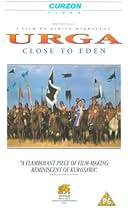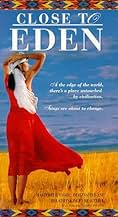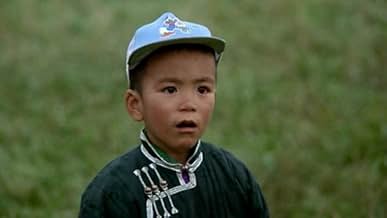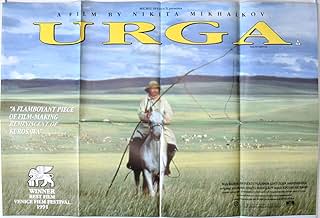Ajouter une intrigue dans votre langueA curious friendship develops between Gombo, a young Mongolian shepherd living with his wife and family in a hut, deep in the wilderness of the steppes, and Sergei, a Russian worker whose tr... Tout lireA curious friendship develops between Gombo, a young Mongolian shepherd living with his wife and family in a hut, deep in the wilderness of the steppes, and Sergei, a Russian worker whose truck breaks down not far from Gombo's hut.A curious friendship develops between Gombo, a young Mongolian shepherd living with his wife and family in a hut, deep in the wilderness of the steppes, and Sergei, a Russian worker whose truck breaks down not far from Gombo's hut.
- Nommé pour 1 oscar
- 5 victoires et 12 nominations au total
Nikolay Vashchilin
- Nikolai
- (as Nikolai Vachtchiline)
Larisa Kuznetsova
- Marina
- (as Larisa Kuwnetsova)
Nikita Mikhalkov
- Bicycle rider
- (uncredited)
Avis en vedette
If you ever wondered how an ordinary life could have been like without constant bombardment of television, ads and all the trappings of a hierarchical society, this movie beautifully depicts the life such a family, in the process of being unconsciously absorbed by the modernity the rest of us are so familiar with. The lead guy's performance as he tries to bemusedly make sense of the city and its services and warez is very touching. Its sad to see a strong, capable, independent soul finely tuned to the nature he is part of being slowly displaced by the "greater" civilisation, but its also an uplifting narrative of escapisim to a place where the contradictions and pretensions of the organised society does not exist.
10johan-16
This movie shows us a world without any borders, laws. Just a bunch of people who live in a superb nature, which fills the wide moviescreen in its endless beauty. It reminds us, how far we are away from nature, from our roots of our ancesters. That's why I think this movie appeals the people from all over the world. And especially those who like the widescreen movies from John Huston to Visconti. Only for the superb shots you can see it over and over again. It's, without any doubt a timeless beaty
One of the most beautiful and lyrical films that I have ever seen, one of those experiences where you walk into a theatre not knowing what to expect and walk out of the theatre wanting to drag everyone you've ever known into the theatre to see it.
I can't imagine why this Oscar-nominated film is not available on DVD but it's well worth your annual haul-out-the-VHS-player-one-more-time weekend look. At first you'll feel like you're eavesdropping on something very private, but by the end of the film you may wish that you were one of the family.
I don't' like to give away plot points when commenting on a movie, in fact I don't even like to watch previews-of-coming-attractions because they give away too much of the story. I like to walk into a movie blind, and trust me on this one, you'll be glad you made the journey.
I can't imagine why this Oscar-nominated film is not available on DVD but it's well worth your annual haul-out-the-VHS-player-one-more-time weekend look. At first you'll feel like you're eavesdropping on something very private, but by the end of the film you may wish that you were one of the family.
I don't' like to give away plot points when commenting on a movie, in fact I don't even like to watch previews-of-coming-attractions because they give away too much of the story. I like to walk into a movie blind, and trust me on this one, you'll be glad you made the journey.
The best definition I can give to movies I greatly admire is that they take me someplace I don't expect to go.
It can be a special location. It can be a special moment. It can be a special revelation.
Close to Eden, as this movie has been titled in the United States, offers the entire combination. A 1992 Russian nominee for the Oscar for Best Foreign Language Film, the movie opens on the vast grassy expanses of the steppes of Mongolia, where the setting initially is evocative of a certain timelessness. The historical instant cannot be ascertained confidently, even within an error margin of a few centuries. Nor do we know what the movie designs ultimately to tell us.
Such uncertainty begins to give way as a vehicle and visitor enter the scene and are involved in a mishap that results from first sleepiness and then fright. The nature of the vehicle and visitor narrow the reference era to an accuracy level of mere decades. From there, the plot leads to a likable nuclear family of herders, to which a grandmother is attached. We follow their story and soon learn when, among the vast expanses of time, it occurs.
The theme here is subtly...ecological...in three parts. The first part concerns the lifestyle of the family, and its self-sufficiency. The second part concerns the travel the father undertakes, and the reason for the travel, an assigned errand he seeks to accomplish in the course of that journey. The third part concerns the conclusion, where the issue of time again intervenes. There is in fact no timelessness, but rather its passage. The narrator in A River Runs Through It is "haunted by waters." Similarly, the ending of Close to Eden is haunted by grasses. Its status as one of the great foreign films arrives in the last few knockout minutes.
It can be a special location. It can be a special moment. It can be a special revelation.
Close to Eden, as this movie has been titled in the United States, offers the entire combination. A 1992 Russian nominee for the Oscar for Best Foreign Language Film, the movie opens on the vast grassy expanses of the steppes of Mongolia, where the setting initially is evocative of a certain timelessness. The historical instant cannot be ascertained confidently, even within an error margin of a few centuries. Nor do we know what the movie designs ultimately to tell us.
Such uncertainty begins to give way as a vehicle and visitor enter the scene and are involved in a mishap that results from first sleepiness and then fright. The nature of the vehicle and visitor narrow the reference era to an accuracy level of mere decades. From there, the plot leads to a likable nuclear family of herders, to which a grandmother is attached. We follow their story and soon learn when, among the vast expanses of time, it occurs.
The theme here is subtly...ecological...in three parts. The first part concerns the lifestyle of the family, and its self-sufficiency. The second part concerns the travel the father undertakes, and the reason for the travel, an assigned errand he seeks to accomplish in the course of that journey. The third part concerns the conclusion, where the issue of time again intervenes. There is in fact no timelessness, but rather its passage. The narrator in A River Runs Through It is "haunted by waters." Similarly, the ending of Close to Eden is haunted by grasses. Its status as one of the great foreign films arrives in the last few knockout minutes.
"Close to Eden" (Russian, 1992): Living on the simple, harsh, flowing Steppes of China/Mongolia, we meet a traditional family. By the photography and music, it's clear from the start that we should to accept, if not admire, their difficult but very satisfying life. Yes, there are signs of contemporary urban society the young son wears a baseball cap, the daughter plays the accordion, and the wife wants her husband to travel to the nearest city for condoms (they are already over the legal limit of children), and a television. Eventually in the position of helping a stranded Russian truck driver, the husband travels with him to an urban "center" and deals with "city" life. "Close to Eden" patiently mutates from a beautifully straight forward "document", to one full of symbols - not just the threat of encroaching urban blight, but reminders of their proud racial past. Eventually narrated by the fourth son (any more than two is illegal in rural China), and named after the great Genghis Khan, he completes the story long after his grandmother, parents, and original hut are gone.
Le saviez-vous
- AnecdotesThis was the first film nominated for an Academy Award for Best Foreign Language Film from Russia. Previous nominees from that country had been submitted from The Soviet Union. It lost to France's Indochine (1992).
Meilleurs choix
Connectez-vous pour évaluer et surveiller les recommandations personnalisées
- How long is Close to Eden?Propulsé par Alexa
Détails
- Date de sortie
- Pays d’origine
- Langues
- Aussi connu sous le nom de
- Close to Eden
- Lieux de tournage
- sociétés de production
- Consultez plus de crédits d'entreprise sur IMDbPro
Box-office
- Brut – États-Unis et Canada
- 377 832 $ US
- Brut – à l'échelle mondiale
- 377 832 $ US
- Durée
- 1h 59m(119 min)
- Couleur
- Rapport de forme
- 1.85 : 1
Contribuer à cette page
Suggérer une modification ou ajouter du contenu manquant



























